Leadership Project Part 3: CCSS Parent Workshop
Introduction
A Common Core ELA Parent Workshop was conducted on Wednesday, March 26, 2014, for parents and community members in grades K-8. This parent workshop was developed and led by Nicole Scheppers, the school's CCSS ELA Moderator. The workshop was aimed at informing parents, in grades K-8, about 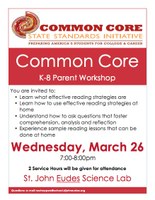 CCSS ELA: Reading Standards as well as providing them information and resources to aid CCSS implementation at home with their children.
CCSS ELA: Reading Standards as well as providing them information and resources to aid CCSS implementation at home with their children.
At this point in the school year teachers, in grades K-8, had been working with CCSS for seven months and were both knowledgeable and experienced with Common Core ELA Standards. In order to foster the school's mission of inclusion and maintain transparency between all stakeholders it was important
to include parents and community members in the adoption and implementation of the standards. The parent workshop not only included all stakeholders but also spoke to the parent component of education aligning with the school's philosophy "While parents serve as the primary educators, we serve as facilitators of learning that teach students to think, learn and make decisions." It was important to uphold this philosophy and include parents in creating a mutual understanding of Common Core as well as its application inside the classroom and at home to ensure consistency, parent support and collective expectations for our students.
Evolution, Data and Observations
In order to foster parent participation for the Common Core ELA Parent Workshop a school wide parent survey was sent out via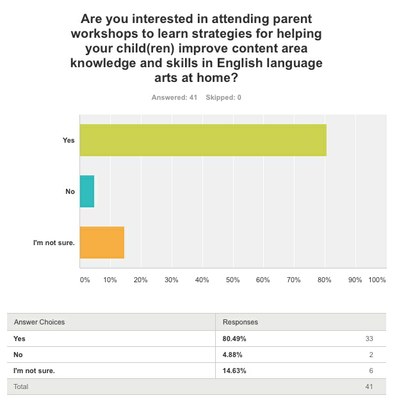 text message by administration. The survey consisted of multiple choice as well as short answer questions pertaining to parent interest in attending a workshop, content area interest as well as time preference.
text message by administration. The survey consisted of multiple choice as well as short answer questions pertaining to parent interest in attending a workshop, content area interest as well as time preference.
Question one results asked if parents would like to attend a parent workshop concerning CCSS ELA. Survey results indicated that 33 out of 41 respondents, 80.49% of survey participants, were interested in attending a workshop aimed at helping children "improve content area knowledge and skills in English language arts at home."
Question four results indicated that the majority of parents, 73.17%, preferred workshops hosted on-campus from 7:00-8:00pm. These results allowed for parent input regarding the time of the workshop and also ensure some parent attendance by prioritizing their requests and schedules.
To advertise the Parent Workshop information was sent home a month prior to the event and every week after via the Weekly Family Envelope which included a Parent Workshop Flyer. In addition, the event was posted on my class web page, the school calendar and the school's Facebook page to generate interest and advertise. RSVP's for the event were taken through the front office, although all guests, both accounted for and not were welcome. In total, 19 parents and community members attended the event.
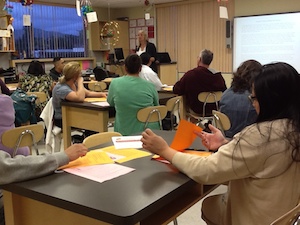 The main focus of the workshop was to give parents insight into CCSS ELA: Reading, the rigor and the expectations of Common Core as well as materials and resources for them to support their child's academic development at home. To begin the workshop a CCSS Sample Benchmark Assessment was informally administered to parents. Upon completion of the assessment, parents identified commonalities between the Common Core assessment and current school assessments. In addition, parents noted what struck them about the CCSS assessment as well as how they felt their children would fair on such an assessment. The grade level of the sample assessments was purposefully left off of the assessment and a discussion took place in which parents were asked what grade level they felt the assessment was appropriate for and why. The majority of parents felt the CCSS Sample Benchmark Assessment provided was meant for middle schoolers while in actuality it was a fourth grade CCSS Assessment. This assessment provided parents first hand access to what CCSS assessments look like and the demands of the standards.
The main focus of the workshop was to give parents insight into CCSS ELA: Reading, the rigor and the expectations of Common Core as well as materials and resources for them to support their child's academic development at home. To begin the workshop a CCSS Sample Benchmark Assessment was informally administered to parents. Upon completion of the assessment, parents identified commonalities between the Common Core assessment and current school assessments. In addition, parents noted what struck them about the CCSS assessment as well as how they felt their children would fair on such an assessment. The grade level of the sample assessments was purposefully left off of the assessment and a discussion took place in which parents were asked what grade level they felt the assessment was appropriate for and why. The majority of parents felt the CCSS Sample Benchmark Assessment provided was meant for middle schoolers while in actuality it was a fourth grade CCSS Assessment. This assessment provided parents first hand access to what CCSS assessments look like and the demands of the standards.
Reading concepts, strategies and resources to use at home were reviewed with parents and provided for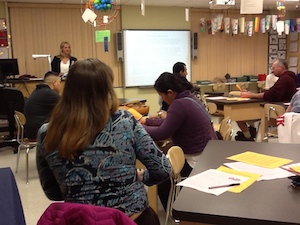 at home support in addition to reviewing a sample benchmark assessment. The reading concepts and strategies presented and reviewed with parents were the same ones revised and presented to teachers during professional development. It was extremely import an to be consistent in the language and vocabulary of CCSS both at home and in the classroom to ensure consistency. These concepts and strategies were also reviewed with parents to familiarize them with what students are doing in the classroom, how they are being applied at various grade levels and introduce unfamiliar concepts to create mutual understanding among all stakeholders. In addition to reading concepts and strategies reviewed resources were also provided to parents providing them valuable materials they could use to supplement academic instruction at home. Again, these materials were reviewed with parents to ensure mutual understanding and application across various grade levels and levels of expertise.
at home support in addition to reviewing a sample benchmark assessment. The reading concepts and strategies presented and reviewed with parents were the same ones revised and presented to teachers during professional development. It was extremely import an to be consistent in the language and vocabulary of CCSS both at home and in the classroom to ensure consistency. These concepts and strategies were also reviewed with parents to familiarize them with what students are doing in the classroom, how they are being applied at various grade levels and introduce unfamiliar concepts to create mutual understanding among all stakeholders. In addition to reading concepts and strategies reviewed resources were also provided to parents providing them valuable materials they could use to supplement academic instruction at home. Again, these materials were reviewed with parents to ensure mutual understanding and application across various grade levels and levels of expertise.
To culminate the evening there was a brief question and answer portion where parents could ask individuals and child centered questions about application of strategies and materials. A follow up email was sent out to parents who attended the event to thank them for their participation. The email also included a brief survey about the event and provided some additional information parents requested during the question/answer portion of the evening. For those parents and members of the community that were unable to attend the event the handouts, materials and resources were provided via the weekly family envelope as Family Envelope CCSS ELA: K-8 Reading Information for parents to review at home on their own time.
Surveys were sent to participants via the online server SurveyMonkey and parents were able to completed the short answer, scale and multiple choice questions at their earliest convenience from home. Survey results for the evening indicated that 100% of the participants felt that information was presented "very clear" to "extremely clear". 100% of parents also felt they would "implement some of the techniques discussed at home" with their child(ren). One parent commented:
"LOVE the handouts. I appreciated the terminology list and brief description. This will enable me to "speak the same language" with my child as she hears at school. Especially enjoyed the "How parents can help" suggestions. They are clear and easily implemented. I will definitely incorporate these ideas into our reading/language study at home."
In addition to following through at home with materials and resources, attendees enjoyed the presentation, the format, the location, the time and the presenter. Most important, 87.5% of people surveyed answered they were "extremely likely" to attended a future parent workshop regarding Common Core identifying the importance of engaging parents as stakeholders in the process of implementing any shift in policy or adoption of new curriculum.
Reflection
Although I was nervous to present to a group of parents the event was extremely successful and nothing but positive feedback was received from parents, community members and administration. This reassured my mission to implement Common Core as well as my personal confidence. Considering the evening and what was covered and not covered in regards to future implementation I would try and have parents work collaboratively to create materials for use at home and practice strategies, concepts and questions with another. While time during this specific parent workshop did not allow for a "make and take session" in the future it would be beneficial to give parents the opportunity to work together, discuss their children, and create, share and practice using materials. As the school rolls out Common Core and begins adoption of Speaking & Listening, Language, Writing and Math CCSS it is extremely important to keep parents in the loop. Future information sessions will need to take place with parents in which they can use what they learned at this ELA Parent Workshop and continue to strengthen their knowledge of and working with CCSS applying it to different content areas. All stakeholders in the future will need to be communicated with, have access to and understand CCSS to work together in adopting and implementing the standards to improve curriculum and to overall benefit our students learning.
what was covered and not covered in regards to future implementation I would try and have parents work collaboratively to create materials for use at home and practice strategies, concepts and questions with another. While time during this specific parent workshop did not allow for a "make and take session" in the future it would be beneficial to give parents the opportunity to work together, discuss their children, and create, share and practice using materials. As the school rolls out Common Core and begins adoption of Speaking & Listening, Language, Writing and Math CCSS it is extremely important to keep parents in the loop. Future information sessions will need to take place with parents in which they can use what they learned at this ELA Parent Workshop and continue to strengthen their knowledge of and working with CCSS applying it to different content areas. All stakeholders in the future will need to be communicated with, have access to and understand CCSS to work together in adopting and implementing the standards to improve curriculum and to overall benefit our students learning.
Supporting Documents
CCSS Sample Benchmark Assessment
Family Envelope CCSS ELA: K-8 Reading Information
Parent Workshop Follow-up Survey
Parent Workshop Follow-up E-mail
CPSEL CONNECTION
Standard 1: Facilitating the development, articulation, implementation, and stewardship of a vision of learning that is shared and supported by the school community.
- 1.1 Develop a shared vision
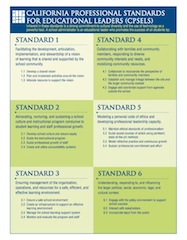
- 1.2 Plan and implement activities around the vision
- 1.3 Allocate resource to support the vision
Standard 2: Advocating, nurturing, and sustaining a school culture and instructional program conducive to student learning and staff professional growth.
- 2.1 Develop school culture and ensure equity
- 2.2 Guide the instructional program
- 2.3 Guide professional growth of staff
- 2.4 Create and utilize accountability systems
Standard 3: Ensuring management of the organization, operations, and resources for a safe, efficient, and effective learning environment.
- 3.1 Ensure a safe school environment
- 3.2 Create an infrastructure to support an effective learning environment
- 3.3 Manage the school learning-support system
- 3.4 Monitor and evaluate the program and staff
- 4.1 Collaborate to incorporate the perspective of families and community members
- 4.3 Engage and coordinate support from agencies outside the school
Standard 5: Modeling a personal code of ethics and developing professional leadership capacity.
- 5.1 Maintain ethical standards of professionalism
- 5.2 Guide sound courses of action using pertinent, state-of-the-art methods
- 5.3 Model reflective practice and continuous growth
- 5.4 Sustain professional commitment and effort
Standard 6: Understanding, responding to, and influencing the larger political, social, economic, legal, and cultural context.
- 6.1 Engage with the policy environment to support school success
- 6.2 Interact with stakeholders
- 6.3 Incorporate input from the public

